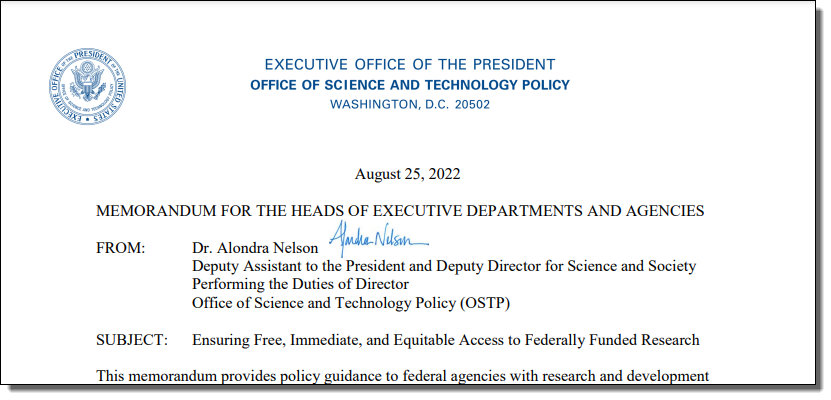
International Open Access Week is October 23 – 29, 2023 and is dedicated to promoting Open Access and the ways students, scholars, and educators can use it for their teaching, learning, and research.
Q: Does the recent The White House Office of Science and Technology Policy (OSTP) public access memorandum (also known as The Nelson Memo) have anything to do with Open Access?
A: Open Access and public access are not the same although they are associated. The August 2022 memo from The White House Office of Science and Technology Policy (OSTP) advises all federal agencies to create or update their public access policies by December 2024 and for the policies to go in effect within the following year. The memo also requires publications and data that are results of federally-funded research to be made public and without an embargo, or delay in their wider availability.
Perhaps the word ‘access’ in both phrases implies similarity. Open Access and public access policies are similar with their intention of promoting research outputs but have different ways of doing so. Open Access is a publishing model for scholarly works such as books and journals. It allows these works to be available without a paywall or subscription, and generally allows their creators to maintain copyright.
In comparison, public access policies are created by funders to highlight their funded research, create transparency, and to inspire additional research or creations. A public access policy will have guidelines for fulfilling their requirements which a scholar should carefully read.
Q: How will The Nelson Memo or other public access policies affect FAU scholars and researchers?
A: The memo does not provide immediate, explicit guidance to researchers, and experts are uncertain about its downstream effects. Its initial language, however, encourages researchers to identify and submit their federally-sponsored research publications or data to a repository. Many agencies will provide lists of recommended repositories or provide their own; for example, PubMed Central is a repository for the US National Institutes of Health (NIH) and its funded research.
Open Access may be an option for researchers to fulfil their public access mandate. Researchers may publish their work in an Open Access journal with (or without) an article processing charge (APC) or waive it through a transformative agreement. They should, however, verify if this fulfils their public access mandate by referring to their funder’s policies.
For more information on Open Access and public access policies, all are welcomed to attend the upcoming International Open Access Webinars from the FAU Libraries.
Open Access Week 2023 Webinars
Issues in Open Access: Transformative Agreements and Deceptive Publishers
Tuesday, October 24, 2023 from 12:00 – 12:30 PM
Via Teams; Register at https://bit.ly/OA-Issues
Scholars and researchers may hesitate to publish in Open Access publication because of common misunderstandings. The main ones are the (sometimes) high costs of getting published and deceptive (predatory) publishers. This half-hour webinar will introduce FAU’s transformative agreements that waive Open Access fees. In addition, the webinar covers deceptive publishers, their characteristics and ways to consider if a publication may be one.
Recommended for faculty, postdoctoral scholars, graduate students, and staff and undergraduate students with interests in scholarly publishing.
Public Access Policies: What They Mean to Scholars
Thursday, October 26, 2023 from 12:00 – 12:50 PM
Via Teams; Register at https://bit.ly/OA-Public-Access
Research funders, whether they are a federal agency or an organization, are increasingly requiring the results of their funded research to be publicly available. Last year’s memorandum from Office of Science and Technology Policy (OSTP), known as The Nelson Memo, expanded public access policies in federal agencies that fund research and development. This webinar will provide an overview of these policies and ways to discern their requirements so researchers can prepare their workflows and successfully adhere to them.
Recommended for faculty, postdoctoral scholars, graduate students, and staff and undergraduate students who work with research funding.
For more information, see Scholarly Communication Services or contact kpadron@fau.edu
 FLORIDA ATLANTIC UNIVERSITY
FLORIDA ATLANTIC UNIVERSITY
